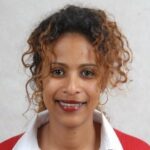The Internet Society and AFRINIC collaborated to organize the 3rd Hackathon@AIS in Kampala, Uganda, which took place alongside the 2019 Africa Internet Summit. The event attracted more than one hundred participants who took part in five different tracks at the event. The event has grown from three tracks and 39 participants in 2017 and three tracks with 75 participants in 2018, to five tracks with 100 participants this year. Cisco DevNet has been helping organize the event since the first edition, and this year, they sponsored t-shirts for the Hackathon.
Objectives
The goals of the Hackathon@AIS and other open standards promotion activities in the African region are to identify, encourage, and expose engineers from Africa to open Internet Standards development, so that they can contribute to the work at organizations such as the Internet Engineering Task Force (IETF).
Format
The event ran for two days, organized as follows:
- Day 1, June 19th, Morning
- Opening session covering the goals of the meeting and the overall structure
- Registration formalities of participants – using information gathered during the registration process earlier in the year, participants were added into corresponding tracks with each track having its own meeting room and facilitators
- Room and lab setup – connectivity was provided via the Africa Internet Summit connectivity provider (SEACOM)
- Day 1, June 19th, Afternoon
- Hackathon activities in each track
- Day 2, June 20th, Morning
- Hackathon activities in each track
- Day 2, June 20th, Afternoon
- Presentation of results from each track (available on the event website)
- Closing ceremony with awarding of t-shirts.
The Tracks
This year, there were five tracks:
Network Programmability
In this track, participants were introduced to network programmability concepts and components, including IETF standards such as YANG, NETCONF, and RESTCONF. They then applied what they learned using tools such as pyang, ncclient, and Postman, programming languages such as Python, and sandboxes from Cisco DevNet that provided access to network devices.
Network Time
In this track, participants were taken through Network Time and the work going on at the IETF on how to secure NTP. It started with an introduction on plain NTP, and its basic packet format. The participants learned about wireshark and compiling from source. Later NTS (Secure Network Time) was explained and how it is finally heading to becoming an RFC. This part of the track was challenging due to the mathematics involved. Participants got to work with Chrony and presented their findings at the closing ceremony.
IPv6
In this track, participants were taken through IPv6 and given a breakdown of the IETF IPv6 working groups (6MAN and v6OPS) and the role of the Working Group chairs at the IETF. Participants were challenged with enabling IPv6 in several IPv4 only open source tools, some of which were completed successfully.
The facilitators proposed that a follow up be made to keep the flame burning, by helping the participants get more familiar with current drafts that are being discussed in the various IPv6 related working groups.
IPWAVE
This track covered testing an implementation of a draft being discussed at the IETF under the IPWAVE working group. The author of the track, Professor Nabil Benamar, lead the group in testing some implementations proposed in the draft.
Measurement
This track covered DNS over TLS (DoT) and DNS over HTTPS (DoH) setups and measuring the performance of caching resolvers against locally-setup DoT and DoH servers against publicly available DNS resolvers. The purpose was to find out the performance differences and the requirements for running a local DoT or DoH server. Some of the results indicated that of the publicly available DNS resolvers, Quad9 (9.9.9.9) returned responses the quickest in Africa, but local resolvers (installed in the local lab) were still quicker. Do read a more conclusive report from Willem Toorop from NLnet Labs, who was one of the lead facilitators at the Measurement Track.
Presentations and Materials
Presentations and other content from the event can be found at https://hackathon.internetsummitafrica.org.
Feedback
Feedback from participants has been positive with almost all participants indicating that the event got them interested in Open Internet Standards and the work going on at the IETF. On what could be improved, the most common feedback from participants has been to increase the number of days for the event which currently stands at 2 days. Participants said more days would allow for more in-depth coverage of document lifecycles (from drafts to RFC) and more time to get into the technical content covered in each track.
Moderator feedback was similar with more time available noted as being key to covering more content in depth.
Outcome
Participants from some of the tracks such as the IPWAVE went on to update the IPWAVE Working Group at the IETF with the results of their findings from the event. Several participants have also indicated interest in organizing similar activities in their localities or organizing remote viewing hubs for meetings such as the IETF.
Gratitude
The organizers would like to thank the expert facilitators who lead the tracks, the AFNOG tech team for providing the required connectivity, and AFNOG and AFRINIC for sharing the venue during the 2019 Africa Internet Summit.
TheHackathon@AIS 2019 Facilitators were:
Network Programmability
- Charles Eckel
- Isabel Odida
- Michelle Opiyo
NTP
- Loganaden Velvindron
- Christer Weinigel
- Jeremie Daniel
Measurement (DNS)
- Willem Toorop
- Jasper van Hertog
IPWAVE
- Nabil Benamar
- Manhal Mohammed
IPv6
- Fred Baker
- Stephen Honlue
- Brice Abba
Organizing Team
- Marsema Tariku (ISOC)
- Stephen Honlue (AFRINIC)
- Charles Eckel (Cisco)
- Nabil Benamar (Morocco – School of Technology Meknes, University of Moulay Ismail)
- Willem Toorop (NLNET Labs)
- Fred Baker
- Kevin G. Chege (ISOC)
Report Compiled by:
- Stephen Honlue
- Charles Eckel
- Nabil Benamar
- Willem Toorop
- Kevin G. Chege
- Loganaden Velvindron

